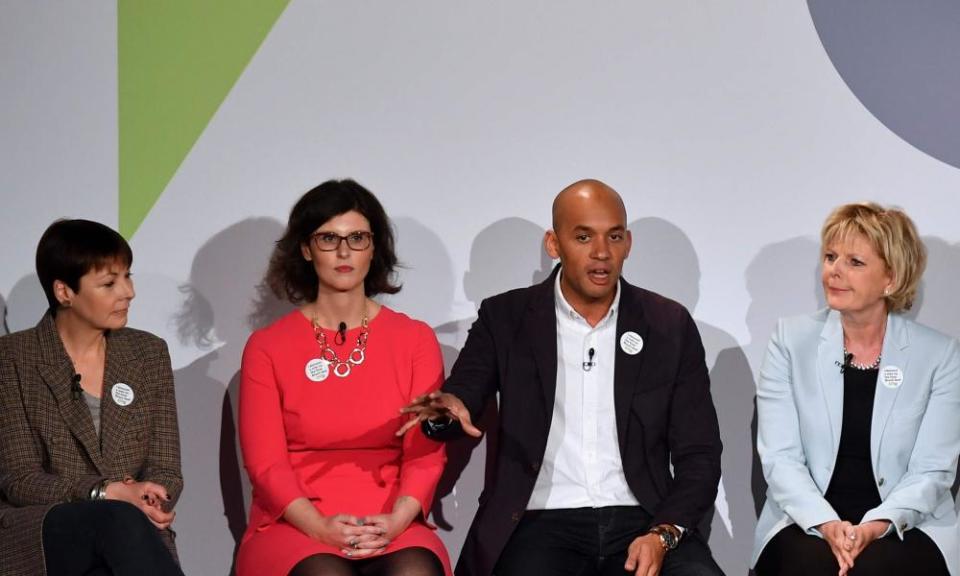Prospect of a new UK party grows as Brexit shifts ground at Westminster

Britain’s political landscape has already been reshaped irrevocably by the Brexit vote. But there is a growing feeling at Westminster that the deep divisions over whether, and how, Britain should break from the EU, cannot be contained within the existing party system.
Within Labour in particular, turmoil from the party’s handling of antisemitism has also tested the loyalty of MPs, some of whom were already sceptical of Jeremy Corbyn’s leadership, and want to see him take a more strident anti-Brexit position.
When Len McCluskey, the general secretary of Labour’s biggest union backer, Unite, unleashed a strongly worded attack against Chuka Umunna last week, he was reflecting concern that Corbyn’s leadership could be destabilised by even a relatively small number of high-profile defections.
One senior party figure suggested Corbyn’s core team, hardened by the “chicken coup” that followed the EU referendum in 2016, were eliding several separate but related threats. The fear that the leadership was under attack again was leading to conflation, the source said.
Separate possibilities exist but are not necessarily directly related. Firstly, a number of Jewish MPs seriously considered resigning the whip over the party’s handling of antisemitism before the summer, and the resurgence of the issue has made that threat salient once more.
“There are MPs who are being pushed to the absolute limit,” said one. Several suggested that had the party followed through with the idea of disciplining the MP Margaret Hodge, who had faced a formal inquiry for calling Corbyn an antisemite, that would have been the breaking point. The party later dropped action against Hodge.
Secondly, but separately, a group of centrist MPs, including Umunna and fellow Labour MP Chris Leslie, are widely believed to be laying the groundwork for the creation of a new party although both have denied this.
Thirdly, Simon Franks, the millionaire co-founder of the film rental business LoveFilm, is preparing to launch a centrist, anti-politics party, United for Change, perhaps as soon as next month.
“Franks wants to be the new Emmanuel Macron,” said one person with knowledge of the project, believed to have a £50m budget. United for Change is not believed to have any big name politicians on board yet.
McCluskey’s attack on those mulling the possibility of a new party was echoed on social media by other vocal supporters of the Labour leadership, known as “blue tick Corbynistas” by those on the right of the party, and by the shadow chancellor, John McDonnell.
In a tweet apparently directed at Umunna, McDonnell said:
For anybody to use the issue of antisemitism as a cover for launching a new political party they had been planning for nearly two years would rightly be seen as an act of appalling cynicism, basely exploiting a genuine concern that people of goodwill are working hard to address.
— John McDonnell MP (@johnmcdonnellMP) August 16, 2018
Despite the anxieties of the leadership, next spring, after the end of March date set for Brexit, is deemed by centrist MPs to be the most auspicious moment for launching a new party.
“There’s a very strong feeling that it must not be a distraction from our goal to stop Brexit, just at the moment” when stopping the UK leaving the EU may be possible, said one MP.
One former remain campaign source said: “The intention is real and serious but it is unlikely before Brexit. The argument will be that the country needs a new political force to bring it together post-Brexit.
“But I would guess the real incentive for any MP to jump … will be a threat of deselection. And that is why a lot of people are watching carefully to see if anything comes of the local attempts to deselect Kate Hoey or Frank Field.”
Leslie, the MP for Nottingham East, is widely viewed as being at risk of deselection. He used a brief stint as shadow chancellor in 2015 to argue that Labour had lost the general election partly because its economic policies were too leftwing, and has since been a trenchant critic of Corbyn’s leadership.
In June, he published a wide-ranging policy paper, called Centre Ground, under the auspices of the Social Market Foundation thinktank. Many saw the document as laying the intellectual groundwork for a future new party.
Chapter headings included, “evidence not ideology”; and “representative democracy not populism”.
But Labour is not the only party being pulled in at least two directions by Brexit, with hardline Tory backbenchers mobilising to force Theresa May to ditch her Chequers deal. “I don’t see how my party can survive. I really don’t,” said one Conservative MP.
Some of the party’s centre-right have begun reaching out more regularly. George Freeman, the MP for Mid Norfolk, has invited senior Tory, Liberal Democrat and Labour figures to attend his Big Tent Ideas festival next month, co-hosted by the peer Sally Morgan, a former aide to Tony Blair. Labour MPs scheduled to attend include Harriet Harman, Liam Byrne and Peter Kyle.
Freeman has denied that the festival is in any way linked to plans to form a new centre party, but he set tongues wagging after inviting Emmanuel Macron to address the event. The French president won office after creating a new centrist movement, La République En Marche.
The final piece of the puzzle is the question of the Lib Dems, the original centrist, alternative party that is still struggling in the polls. The party is “ripe for entryism, which we’re not totally against”, one source said.
The Lib Dems are pinning their hopes for revival on some radical reforms to be presented at party conference in September. These include measures to widen its membership, to allow supporters as well as members to vote in leadership elections and to change its leadership rules to allow non-MPs to stand as party leader.

 Yahoo News
Yahoo News 